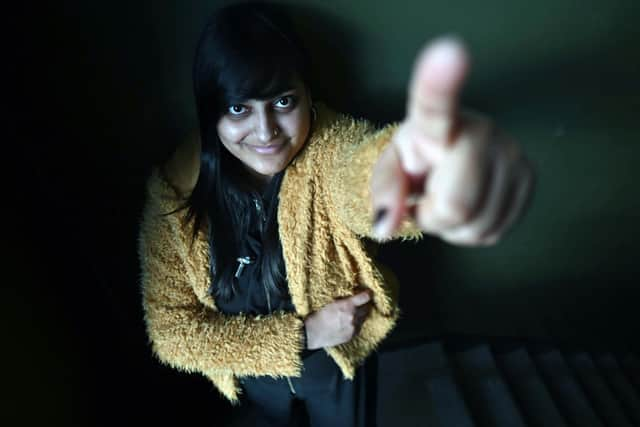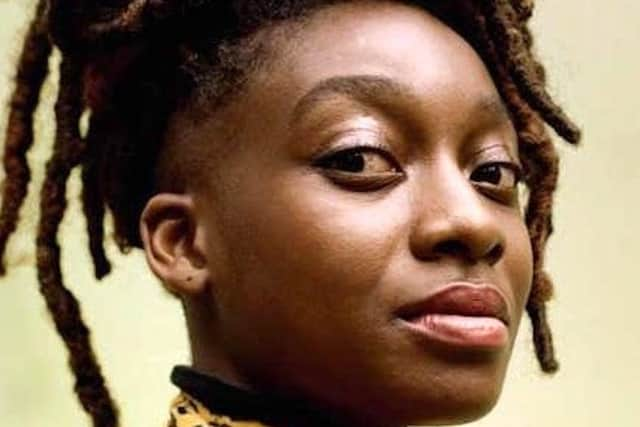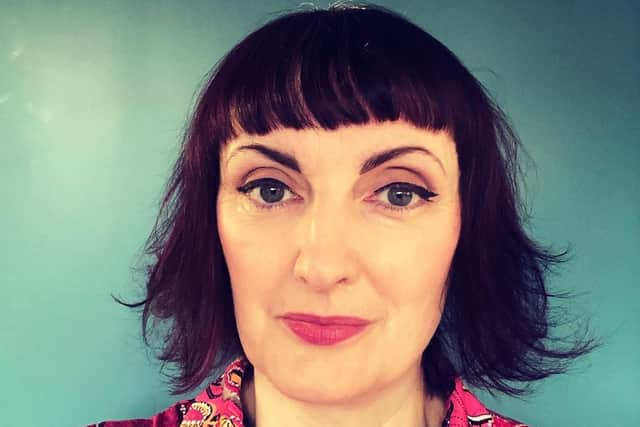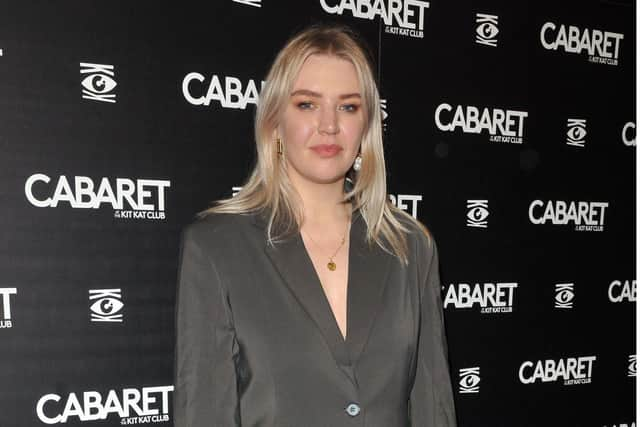Meet the generation of female writers changing whose stories are told and how - Dani Garavelli
But Rabia also liked female artists: Salt-N-Pepa, TLC, Queen Latifah, Missy Elliott - and so did her little sister. “The main thing I loved about them was the all-out feminist energy so many of them seemed to have,” Arusa says. “Seeing not only people of colour but women of colour on screen – powerful, confident and completely in control – contributed to what I believed was possible for us growing up.”
Back then, Qureshi didn’t know about the misogyny and homophobia that blighted the genre. She didn’t notice that men ruled the roost, or that female hip hop artists struggled to be taken seriously. She just enjoyed the music.


Advertisement
Hide AdAdvertisement
Hide AdLater though, at Edinburgh University - where she wrote her dissertation on Defiance in Hip Hop - and as a writer at, then editor of, The List magazine, she became aware of how few women were included in “best of all-time” hip hop lists. Pioneers such as Sha-Rock, the first prominent female MC, and Mercedes Ladies, the first all-female hip hop group, helped revolutionise the genre yet were left out of historical analysis. “It wasn't about women not existing,” Qureshi, 28, says. “It was about visibility and often erasure.”
She sought to redress the balance with her book Flip the Script. It highlights women in the UK hip hop scene, starting with Cookie Crew. Composed of rappers Debbie "MC Remedee" Pryce and Susan "Susie Q" Banfield, Cookie Crew enjoyed some success in the UK (the Beatmasters’ single Rok Da House, on which they featured, reached No 5 in 1988). But they chafed against attempts to sexualise their image in the US and their profile faded.
How things have changed. Qureshi's book came out in November - a month after the release of Little Simz’ Sometimes I Might be Introvert which went on to garner critical acclaim and appear in almost every list of the Top 10 albums of 2021.
It was perfect timing. Here was Qureshi highlighting the importance of female hip hop/rap artists just as their talents were finally being acknowledged.


“Little Simz is my hero,” she says. “I wrote a lot in the book about how incredible the album is, how talented she is and how she is finally getting the recognition she deserves.”
The previous year, Nova - Shaheeda Sinckler - had become the first rapper (male or female) to win the Scottish Album of the Year award, while Deyah became the first rapper (male or female) to win the Welsh Music Prize. It was a double whammy Qureshi described as “a seismic shift in both the music industry’s mentality towards women – with emphasis on women of colour – and the general public’s approach to hip hop as a respected and valued art form”.
Little Simz’ success built on that. “She is a symbol of exactly where we are in the UK now,” Qureshi says. “I think she is getting all this attention not only because the album is brilliant - though it is - but because there’s a change in how women are being seen in hip hop.”
But it’s not only in hip-hop that the narrative around women is changing; it spans almost every genre. In 2021, for perhaps the first time, female artists dominated, with Japanese Breakfast, Self Esteem, Snail Mail and Billie Eilish sitting alongside male artists such as Tyler, the Creator on Albums of the Year lists.


Advertisement
Hide AdAdvertisement
Hide AdMusic books due out in 2022 are chock-full of female voices, too. Coming our way from Faber are Kate Molleson’s Sound Within Sound, a look at the sonic pioneers who challenged the world of classical music, and Cosey Fanni Tutti’s Re-Sisters, which links her own work with that of electronic composer Delia Derbyshire and 15th century mystic Margery Kempe.
Meanwhile, we have White Rabbit Books to thank for Vashti Bunyan’s Wayward - a memoir centred on her journey by wagon to the Outer Hebrides in 1968. White Rabbit is also publishing music writer Jude Rogers’ The Sound of Being Human and This Woman’s Work, an anthology of music essays by female writers and musicians edited by author and broadcaster Sinéad Gleeson and Sonic Youth's Kim Gordon. Music journalist Laura Barton’s book Sad Songs - an exploration of the history, science and musicology of our love for sad music - is due out from Quercus in June.
“Have a look at Pitchfork’s Top 50 albums [for 2021]," says Lee Brackstone, who launched the White Rabbit imprint for Orion after leaving his job as head of Faber Social in 2019. "It's about two-thirds female. If you were to check back just five years ago I would say it would probably be about 15-20 per cent female. So something is definitely shifting in the culture.”
Brackstone’s view of what a music book should be began to evolve when - in 2014 - Faber Social published “Clothes, Clothes, Clothes. Music, music, music. Boys, boys, boys” - an offbeat memoir by Viv Albertine of The Slits. When Brackstone took the book to an acquisitions meeting no-one there had heard of The Slits. But it sold 100,000 copies and Faber Social went on to publish Brix Smith's The Rise, the Fall, and The Rise, Kim Gordon's memoir Girl in a Band and a second Albertine memoir To Throw Away Unopened.


“The straightforward and unflinching way Viv told her story really grabbed people,” he says. “I think she opened the doors for a lot of other female artists to feel empowered to tell their story, and for publishers to feel confident this is an area where stories haven’t really been told before.”
Brackstone's successor at Faber, publishing director Alexa von Hirschberg, felt the same way. Before starting her new job (she had been at Bloomsbury), she stumbled on a copy of Jackie Kay’s book on Bessie Smith which was out of print. Smith’s story of poverty, racism and bisexuality seemed to chime with the times, so she decided her first task would be to reissue it. Faber's Music Matters series - all written by women - has already featured Solange, Marianne Faithfull and Karen Carpenter. Caryn Rose's book on Patti Smith is due out in May.
“I felt there was a distinct lack of imagination in music publishing," von Hirschberg says. "The whole idea of what a music book is felt limited and tied to a very distinct demographic, particularly older white men. I felt there was an opportunity to do something more nuanced and interesting because, of course, music carries everything; it carries politics, history, economics, science and migration."
**********
The rise of the female voice is bringing a refreshing new perspective. “I think the male way of writing about music has been quite trainspotter-y, clubby and exclusive," Brackstone says. "If you look at people like Nick Hornby - a lot of it is about knowledge, about collecting. It has an elitist feel to it. A writer like Jude [Rogers] is the antithesis of that - she is broader, poppier in sensibility, more universal and inclusive.”
Advertisement
Hide AdAdvertisement
Hide AdThis shift is exciting for someone like me who was put off by the aura of male competitiveness around music. But it’s even more liberating, I imagine, for those women who have had to fight for their place within the industry.


Gleeson grew up in a house full of music; her father had a second job as a bass player, her brother was in bands, records and books had sustained her during periods of ill health. “As a teenager, all my money went on vinyl rather than make-up,” she says.
And yet, when she started writing about music for the Irish Times, she found men were constantly challenging her. “I would encounter Irish radio DJs, or men in bands or men with large record collections, who thought they knew more than me," she says. "They would say: ‘Why did you use that word? Or why did you describe it like that?’ which meant ‘I know more than you’. Then I'd be introduced to other music journalists and they would say: ‘Name five B sides by this band.’ They were always trying to trip you up.”
When Barton started writing about music for the Guardian, she would sometimes be mistaken for a groupie or a PR. Even now - with an outstanding reputation and years of expertise - some older men still condescend to her. “Most are respectful, but there are others who will speak to you about something on Twitter and can’t defer to you,” she says. “They will say: ‘You have written about this artist, you might like to check out their earlier band.' Or they will tell me a band I love has a new album coming out. They are trying to make a connection but they do it in a way that’s paternalistic and it drives me up the wall. I’m like ‘I KNOW. It’s my JOB. I’ve known about this album for three months or more'.”
On the other side of the Atlantic, Rose was frustrated both by the way female music writers were treated and the way female musicians were portrayed by men. “Holly George-Warren wrote a biography of Janis Joplin a few years ago and it affected me so much because it was the first time I was hearing her story not through the male gaze," she says.
“I was so angry because I realised everything I had read about her over the years had minimised her talent and her impact because men were doing it, and they always had to mention she had frizzy hair and bad skin. I felt like I had been robbed of something because I had read it that way for so many years.”
Now Rose hopes to do the same for Patti Smith who showed her it was possible not to conform to society's idea of what it means to be a woman.
She, Gleeson and Barton are part of a generation of female writers changing whose stories are told and how. That was certainly the rationale behind This Woman's Work. "I guess I wanted to say: 'There’s lots of stories of men in music'," Gleeson tells me. "'They’re the dominant ones and they're often repetitive and boring. Let us show you something else'."
Advertisement
Hide AdAdvertisement
Hide AdThe all-female collection includes essays by Anne Enright on Laurie Anderson, Megan Jasper on her work with Sub Pop Records and Fatima Bhutto on music and dictatorship.
"Not all music stories are just about music," Gleeson says. “Often you learn something different. Maggie Nelson’s essay is about a friend of hers - a rising Mexican American musician who got breast cancer very young and died. It’s not only about a form of music. It’s about their parallel lives and their lives diverging."
Barton’s first foray into music journalism was a Guardian column on how music permeates our lives. "It wasn't 'here’s a hot new band' or 'listen to this album' or whatever," she says. “It gave me a different way to write about music which was less male, less angular." Her book, Sad Songs, is structured around a road trip she took through the Deep South of the US, at a tough time in her life.
Barton also teaches non-fiction writing and is one of the judges on the Penderyn Music Book Prize. Does she think women write about music differently to men? She hesitates. “That’s a thorny question, but yes,” she says. “I don’t want to say it’s more emotional, but I think we are better at talking about the other elements, not just about who produced this, who produced that, and when and in which studio it was recorded, but how music can resonate in all our lives.”
Women connect with this style, but so too do men. In fact, Barton has more male than female readers. “It may be because I am articulating something that men feel but that it is harder for them to say out loud. I think that’s what they respond to, coupled with knowledge and expertise," she says.
********
A greater cohort of female music journalists must be good for female artists whose work they tend to champion (while guarding against being pigeonholed). But the rise of the internet and social media has also created fresh opportunities for both.
“I had to wait to be ushered into the inner circle of the Irish Times," says Gleeson, "but today [an aspiring music writer] can set up a website or go onto Twitter and talk about albums or share Spotify playlists. It’s easier to make a name for yourself now by being knowledgeable and talking loudly.”
Likewise, female artists can promote their work online. With fewer gatekeepers, they can exercise greater control over their work and image. Increasingly, record companies are signing directly from TikTok.
Advertisement
Hide AdAdvertisement
Hide Ad“Look at Lady Leshurr,” Qureshi says. “She struggled to get the music industry interested, but then she put her Queen’s Speech rap videos on YouTube. The fourth one [put up in 2016] got millions and millions of views. Now she performs all over the world and is on TV all the time.”
Female artists have benefited from structural changes, too, and more women in positions of influence. Qureshi points to rapper Rachel Prager - better known as Baby Blue - who is now head of music at Idris Elba’s record company 7Wallace. “She told me she wishes she had had someone like her when she started out as a teenager. Her mentality is very much: ‘We need to make sure these women are protected’.”
On top of her other roles, Barton is an A&R (arts and repertoire) representative with Chrysalis Records’ Blue Raincoat Music, finding promising artists to sign publishing deals.
She highlights the growing number of female A&Rs, record producers and sound engineers: highly respected women like Marta Salogni and Beatriz Artola. “So you have women’s roles shifting within the industry, which is interesting because a lot of the money now comes through synching and touring," Barton says. "Female artists often put on more of a live show and many of the shows which pay large sums for songs are directed at women."
One of the artists Barton works with is Self Esteem - Rebecca Lucy Taylor - whose latest album Prioritise Pleasure, with its overtly feminist energy and lyrics, has catapaulted her to a new level. Prioritise Pleasure topped the Guardian’s and several other album of the year lists.
The fascinating thing about Self Esteem is she forms a bridge between the old era and the new. As the blonde girl in indie duo Slow Club, she suffered the indignities the music industry sometimes inflicts on women. The first single from Prioritise Pleasure, I Do This All The Time, references being told to “stand still”, “stop showing off” and “fit in that little dress of yours”.
Yet here she is now, in her 30s, doing music exactly the way she wants. “She is that transitional generation,” Barton agrees. “The younger ones like Billie Eilish don’t have quite so many restrictions.”
Barton says she cries every time Self Esteem comes on stage because what she is doing means so much. "Even the transition from album one to album two: there’s a greater clarity, a directness, an unflinching quality to [her music and lyrics],” she says.
*************************
Advertisement
Hide AdAdvertisement
Hide AdIf Self Esteem is the future, then it must be bright. Of course, there is still a way to go. Fifteen years ago, Barton was approached by an agent who suggested she could write a book about music and friendship. “I mention this because it illustrates how things were at the time,” she says. “Women weren’t encouraged or expected to write music books and, if they did, they had to be steered towards something fluffier. That’s definitely changing.” And yet, Barton had to ask her publisher to change the proposed front cover of Sad Songs to make it less conspicuously feminine.
The music scene in Ireland is unrecognisable to the one Gleeson started out in - a time when most of the commercially successful acts were male: U2, Westlife, Boyzone. The only big female artists back then were Enya and Sinéad O’Connor.
“There’s definitely a lot more equality and female names and female bands and it seems to be multi-genre too,” she says. In Ireland, the big female acts coming through include the rapper Denise Chaila and Pillow Queens - a band made up of four queer women. Then there is Gemma Dunleavy, a rapper from inner city Dublin. “A lot of these acts are engaged with politics and social issues. Dunleavy talks a lot about property and renting and Pillow Queens talk about housing and queerness.”
But festivals and music panels remain predominantly male. And it is often left to women to challenge residual discrimination.
“When women are left out [of these events] it is other women who call attention to the problem even though we’re not the ones leaving them out,” Gleeson says. “It’s great we do that for each other but why is it up to women? If we want proper equality, we need men to notice and call it out too.”
What Barton wants is for music to become less segregated; for men to stop saying ‘Oh, you’re a girl, you must listen to girl bands’ and realise they can enjoy female artists who are not Joni Mitchell.
She spent years trying to get male friends to listen to Self Esteem without success. “Someone I know - a musician - would say: ‘Is that your menstrual music?’.” But her latest album appears to have broken their resistance. “When she played at the Green Man Festival, there were grown men crying,” Barton says.
It’s a small thing; but then again, it isn’t. If men are moved by an artist so fearlessly articulating the female experience - an artist dealing with what Jude Rogers called “the meat and matter of our lives" - well, that has to be progress.
A message from the Editor:
Thank you for reading this article. We're more reliant on your support than ever as the shift in consumer habits brought about by coronavirus impacts our advertisers.
If you haven't already, please consider supporting our trusted, fact-checked journalism by taking out a digital subscription.
Comments
Want to join the conversation? Please or to comment on this article.
